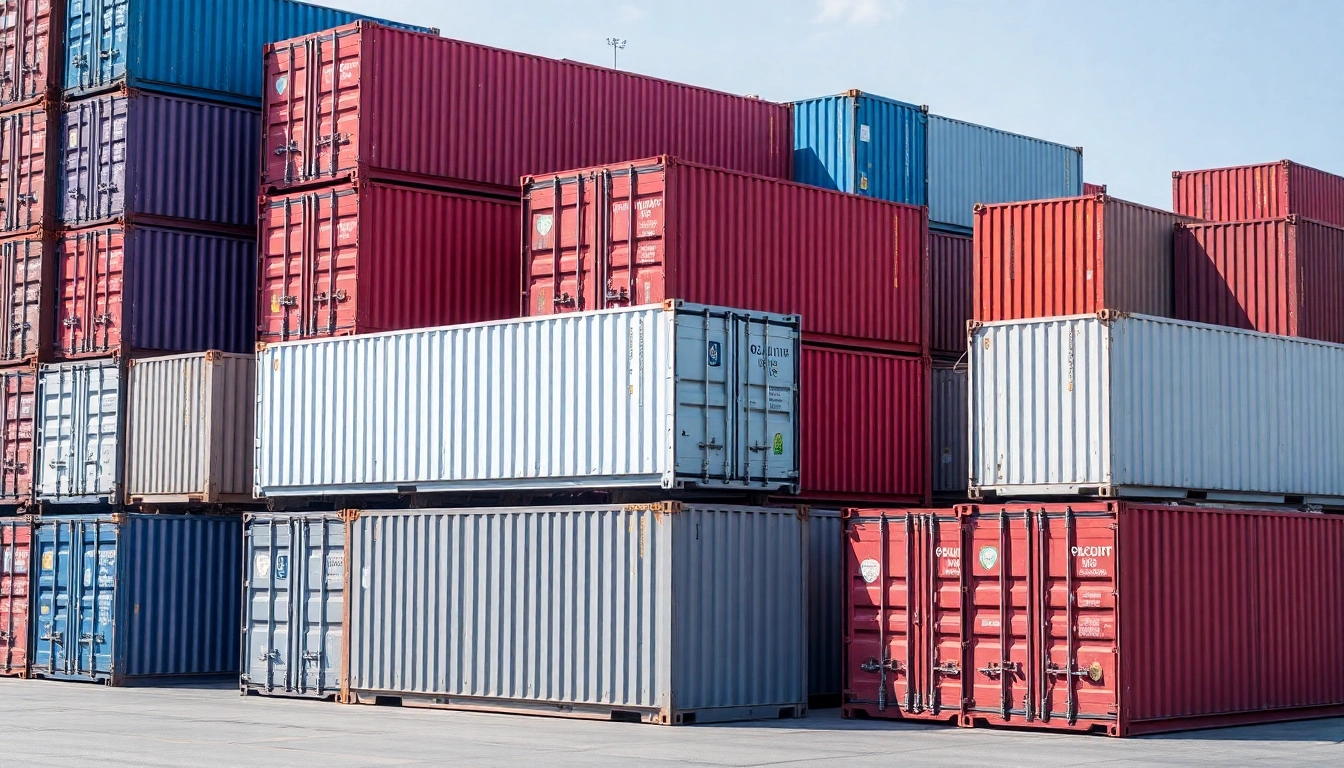Understanding Container Rental: A Complete Guide
In today’s dynamic business environment and expanding infrastructure projects, the demand for flexible and cost-effective storage and transport solutions has surged. One of the most versatile and increasingly popular options is Container rental. Whether for short-term construction needs, long-term storage, or logistical operations, renting containers offers a range of benefits that can significantly streamline your operations.
This comprehensive guide explores everything you need to know about container rental in the UK, from understanding different types of containers to selecting reliable providers and optimizing usage. We aim to equip you with practical insights, industry best practices, and future trends to make informed decisions that add value to your projects or business.
What is Container Rental and How Does It Work?
Defining Container Rental
Container rental involves leasing shipping or storage containers for a specified period, often ranging from a few weeks to several years. This flexible approach eliminates the need for large capital investments in purchasing equipment, providing a cost-effective solution tailored to project timelines or fluctuating storage demands.
Operational Mechanics
The process typically starts with assessing your specific needs—such as the size, type, and security requirements of the container. Once identified, you select a provider that offers the right solution. The provider then arranges delivery to your site or designated location, often with options for customization or additional features. Rental agreements usually specify the rental duration, delivery, and collection terms, along with any maintenance or security responsibilities.
For example, companies like Portable Space offer a wide range of rental containers across the UK, appreciating the importance of flexibility and quick deployment in modern logistics and storage solutions.
Types of Containers Available for Rent in the UK
Standard Shipping Containers
The most commonly rented containers are standardized shipping containers, typically made of high-strength steel or corrosion-resistant materials. Sizes vary from 10ft to 45ft, with 20ft and 40ft being the most popular. These containers are ideal for transporting goods or providing versatile storage options.
Storage Containers
Designed explicitly for secure storage, these containers come in various sizes, such as 10ft, 20ft, 30ft, and 40ft. They often feature secure locks, weatherproof exteriors, and options for insulation or shelving, suitable for retail storage, construction site use, or personal storage needs.
Specialized Containers
Beyond standard containers, the market offers specialized units including refrigerated containers (reefers), open-top, flat-rack, tunnel containers, and custom conversions for unique industry applications. For instance, temperature-sensitive industries rely on refrigerated containers to maintain product integrity during storage or transportation.
Common Industries Benefiting from Container Rental Solutions
Construction and Infrastructure
Construction sites often employ containers as on-site offices, secure tool storage, or for managing waste. Rental options provide quick deployment, flexibility, and cost savings, especially for projects with fluctuating timelines.
Logistics and Shipping
Shipping companies utilize container rentals to facilitate international freight movement, with options for both new and used containers suited for cargo of various types, including bulk materials, machinery, and delicate goods.
Retail and Commercial Storage
Pop-up retail stores, event setups, and seasonal businesses utilize portable containers for flexible storage and point-of-sale spaces, benefiting from quick installation and removal.
Agriculture and Farming
Farmers leverage containers for storing equipment, feed, or harvested produce, capitalizing on secure, weather-resistant options that can be relocated as needed.
Choosing the Right Container Rental Provider
Factors to Consider: Size, Security, Rental Terms
When selecting a container rental provider, evaluate critical factors such as container size, security features, and rental flexibility. For size, ensure it aligns with your storage volume and available space; for security, look for containers with lockable doors, reinforced structures, and security accessories.
Rental terms should be transparent, with clear policies on lease duration, maintenance responsibilities, and restrictions on usage. Flexible rental periods accommodate project changes, while maintenance options prevent downtime.
Comparing Costs and Service Offerings among Top Providers
Cost comparison involves considering daily, weekly, or monthly rental rates, as well as delivery and collection fees. Reputable providers like Storage on Site and Unit Group offer transparent pricing packages that include delivery, setup, and optional customization.
Assessing Provider Reliability and Delivery Options
Reliable providers will have a proven track record, positive customer reviews, and flexible delivery options across multiple locations. Ask about their fleet size, readiness for urgent deployments, and contingency plans for delays, especially considering UK-wide transport and logistics challenges.
Best Practices for Effective Container Rental Usage
Preparing Your Site for Container Delivery and Setup
Proper site preparation enhances safety and efficiency. Clear the area of obstructions, ensure a stable, level surface, and plan for adequate access for delivery vehicles. It’s advisable to inform your team about the delivery schedule and safety protocols.
Maximizing Container Storage and Security
Organize contents systematically, label items clearly, and employ shelving or stacking to maximize space. Security measures, such as padlocks, security alarms, or CCTV, are critical, especially in open or high-risk areas.
Maintaining and Managing Rental Containers Efficiently
Routine inspections for damage, rust, or security breaches are vital. Follow the provider’s maintenance guidelines, keep containers clean, and monitor their structural integrity to avoid costly repairs or downtime.
Innovative Uses and Customization Options
Converting Containers for Specific Industry Applications
Custom modifications extend container functionality—transforming them into offices, accommodation units, workshops, or even mobile clinics. This flexibility allows businesses to tailor containers to precise operational needs, with options such as insulation, windows, HVAC, or electrical wiring.
Adding Features: Insulation, Shelving, Security Enhancements
Enhanced features improve usability and security. Insulation protects contents in extreme climates, shelving optimizes organization, while security enhancements like reinforced doors and alarms safeguard against theft.
Case Studies of Successful Container Rental Deployments
One notable example is a construction firm that converted rented containers into on-site offices, significantly reducing operational costs and turnaround time. Similarly, a logistics company used refrigerated containers for temperature-sensitive shipments, ensuring compliance with health standards and customer satisfaction.
Cost Optimization and Future Trends in Container Rental
Understanding Pricing Models and Hidden Costs
Container rental costs typically depend on size, rental duration, and customization. Common pricing structures include flat rates, per-week charges, or tiered pricing for longer commitments. Hidden costs may involve delivery, pickup, security deposit, or late return fees. Conduct a thorough pricing comparison and clarify all costs before signing agreements.
Emerging Trends: Eco-Friendly Containers and Smart Technology
The industry is shifting towards sustainable solutions. Eco-friendly containers made from recycled materials, with features like solar-powered lighting and energy-efficient insulation, are gaining popularity. Additionally, the integration of smart technology—such as IoT sensors for monitoring temperature, humidity, and security—enhances operational oversight and reduces maintenance costs.
Planning for Scalability and Long-Term Rental Solutions
For growing businesses or projects with evolving needs, scalable container solutions are essential. Long-term rentals often come with flexible terms, discounts, and the option to upgrade or expand. Strategic planning, including assessing future storage or transportation demands, ensures seamless scalability without disrupting operations.









